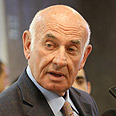
Israel becomes first non-European member in CERN center
Particle accelerator research organization votes unanimously on Israel's admission. Science minister sees acceptance as proof of 'ability to reconcile political disagreements we have with Europeans'
CERN, the European Council for Nuclear Research, is the largest center for the study of particles, founded in 1954. The organization operates two particle accelerators, one of which is the world’s longest.
Related stories:
- Israel winning in Europe
- Shoah survivor shares Nobel in physics
- Israel plays key role in CERN super collider exercise
The organization is in practice an international science center, which employs physicists from around the world, as well as engineers, technicians and managers.
The 20 European members voted unanimously to accept Israel as the 21st member. Israeli scientists have been active in the organization since 1991, when Israel became an observer member.
In 2011, Israel became an associate member, and is now the first member to be geographically located outside of Europe.
Full membership privileges allow Israel’s representatives to integrate into the executive committees, to have an influence on the policies and directions of CERN’s research and to use the organization’s resources. Additionally, membership lets Israel apply for research funds and grants and will allow the State more accessibility to the center’s advanced labs and facilities. It also gives Israeli companies the opportunity to tender for contracts to build or maintain parts of the particle accelerators.
Membership fees are 12.2 million Swiss francs ($13.7 million) per year, which will be funded according to an April 2011 government decision. The Planning and Budgeting Committee of the Council for Higher Education will fund 52%, the Economy Ministry will provide 17%, the Science and Technology Ministry, the Finance Ministry and the Foreign Ministry will all supply 7% each and the Prime Minister’s Office will give 10%.
It has been years since Israel has taken part in CERN’s science and technology projects, for which the organization is currently investing three million Swiss francs per year for the partnership and resources in developing the research area in Israel. Currently, there are 40 Israeli scientists working in the organization, of which 22 have doctorates and four have post-doctorates.
The chairman for the Planning and Budgeting Committee of the Council for Higher Education, Manuel Trajtenberg, welcomed the decision, and said that this was a dramatic milestone for the further promotion of scientific research in Israel. Now, the science community in Israel will benefit from greater accessibility than it did in the past regarding knowledge and the advanced scientific infrastructure that exists in the organization, he said.
It will also lead to a strengthening of scientific ties between Israel and the European community, Trajtenberg said. “This is another badge of honor for Israeli research, which made it to the top world organization in the realm of particle physics.”
Minister of Science, Technology and Space Yaakov Peri said this was a remarkable feat. “This is both a scientific and political achievement, which joins the list of similar achievements in past years. Israeli science continues to prove that it has the ability to reconcile the political disagreements we have with the Europeans. I’m happy that by becoming a member, the world scientific interests have overshadowed the political interests.”
Professor Eliezer Rabinovic, director of the Institute for Advanced Study at the Hebrew University in Jerusalem, who is Israel’s representative in CERN’s council said, “the decision is a joyful recognition of the values of Israeli science and technology. Israel becoming a full-fledged member is a result of exceptional cooperation between the academic world and political representatives, and reaching this moment really warms the heart.”
- Receive Ynetnews updates directly to your desktop










